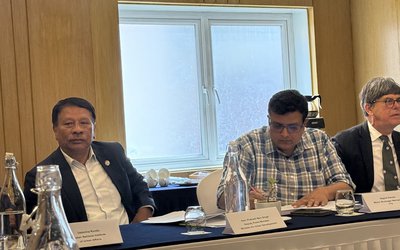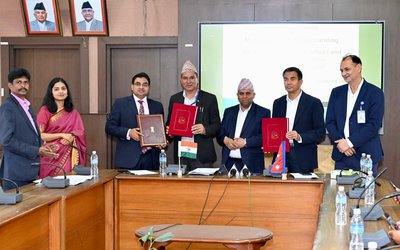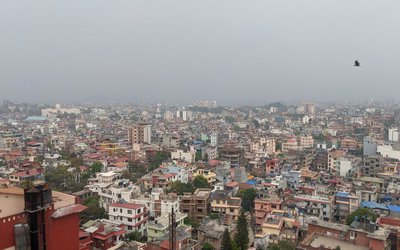Untimely heavy rains that coincided with the paddy harvesting period did extensive damage to the crop and also caused loss of lives and property and destruction of physical infrastructures. It is said that more than 325 thousand tons of paddy worth more than Rs. 8 billion have gone waste. It was indeed an unpleasant situation that confronted the newly-formed Deuba government, which had not inherited a healthy economy from the previous government. Prime Minister Deuba was quick in flying over the affected areas and announcing that compensation\relief will be provided to the affected, but, people are complaining that nothing meaningful has happened even weeks after the much-publicized assurances by no less a person than the head of the government. Observers are undivided in their opinion that the damage caused could impact GDP of Nepal by 2 to 3 percent. It is being apprehended that the current dispensation, confronting problems in several areas, may not be able to arrest the continued deterioration in the economy and things could further worsen.
It may be wise to recollect what finance minister Sharma very deservedly, based on his good work of the past, had observed about speedy execution of the budget, which took weeks to replace the earlier ordinance budget. People saw no reason not to trust Sharma’s positive words about budget execution.A retrospective look, however, shows a pathetic condition of capital expenditure. Little more than 5 percent of the money under this head (Rs.435.24billion) has been spent so far, which has disappointed well-wishers of Sharma who had claimed that in the first three months capital expenditure will be 10 percent and thereafter it will proceed at a rate of 10 percent per month. It may also be interesting to state that capital expenditure in the four months of the last fiscal year was more than Rs.29 billion, while in the corresponding period of this fiscal year it is less than Rs.20 billion. Available indicators abundantly manifest further weakening of our economy. Increasing imbalance between import and export, negative balance of payment (BOP), increasing current account deficit and declining foreign currency reserve and remittances could be cited as some examples. Trade balance and these indicators have continued to deteriorate, which is shown by a three-monthly comparison of these in the two fiscal years. Export in this period has gone up by more than 100 percent, but goods import has also increased by more than 63 percent as against a decline of more than 12 percent in the corresponding period of last fiscal year. Due to this increase, the goods trade deficit has increased by 53 percent to hit more than Rs 413 billion. It had decreased by 15 percent during the period last fiscal year. The current account deficit during the period has crossed Rs.151 billion, which was in surplus by more than Rs.33 billion in the corresponding period of last fiscal year. Remittance has also declined by 7.06 percent and so is the decline (5.07 percent) suffered by foreign exchange reserve. It may also be noted that in the four months of this fiscal year, the total trade deficit has reached Rs.568 billion, the share of export in the total foreign trade being just 11.21 percent. Except in the area of revenue collection, which has approximated 26 percent of the targeted sum, no other area looks positive to ease the growing discomfort of a seemingly worried finance minister. Non-tax revenue is said to have increased impressively, almost doubled in the four months.Net service income, which was in deficit last fiscal year, has further deteriorated to hit more than Rs. 23 billion in the initial months of this fiscal year. The external sector, which has not been doing good since a long, is likely to further deteriorate as the import of basic necessity like rice is bound to increase as internal production of the staple has suffered a setback on account of untimely rain. Production of different items, mainly agricultural products to start with, has to be increased to meet domestic requirements and any surplus available could be exported to the vast Indian market. Enhancing production is, therefore, a must to correct the horrifying trade imbalance. In this context, the scribe is often tempted to cite the case of production and export of tea, which has gradually improved over time. Last fiscal year, tea worth Rs.3.69 billion was exported, mainly to India, while in the three months of this fiscal year, it has already crossed a billion. The annual export of tea has averaged Rs. 3.5 billion, while its import remains at about 3 percent of the exported total. Cross-trade of a commodity should not be a worrying factor as long as we are exporting much more than what we are importing. Instead of announcing time-bound self-sufficiency schemes covering different products and doing nothing substantial to actualize them , it would be wise to initiate implementable schemes to achieve self-sufficiency in products like meat, milk, fish, chicken, green vegetables, etc. Despite repeated claims over the years of different governments to achieve self-sufficiency in rice soon, looking at the growing import of it, about Rs. 35 billion each year, and lack of a substantial programme to increase its production, Nepal is not likely to reach a stage of self-sufficiency in rice soon. On the contrary, a steady rise in the import of it is apprehended. Production of items like tea, cardamom, ginger, coffee, which command a market outside of Nepal, should be encouraged and efforts should be made to encourage their exports in processed form. Hope the setback suffered by cardamom export is temporary and the government of Nepal succeeds in bilaterally resolving trade-related hurdles (both tariff and non-tariff) that surface occasionally between India and Nepal. The concerned may have by now realized that finding soybean oil and palm oil, the raw form of which is imported from outside, on top of the export list should not glorify us because they have not been contributing much to the economy and we have experienced setbacks in the export of these items resulting from small changes in policy\regulation of importing countries. It is just a case of something is better than nothing at a time when this agricultural country is buying most agricultural products from outside.
It is disappointing that banks and financial institutions are experiencing acute liquidity crunch at a time when these bodies were expected to lend more, without violating the prescribed norms, to stir the economy. This crunch could be attributed to some extent to low level of capital expenditure by the government and mainly to aggressive lending of these institutions, which created a sharp imbalance between lending and deposit collection, creating a situation for most commercial banks to exceed the C\D ratio of 90 percent. This newly created situation in the financial sector has contributed to strengthening the headwind that our ailing economy has been facing since a long. No better is the situation in other organs of the state.
Judiciary is in an unprecedented mess with sitting justices of the apex court and Nepal Bar rebelling against Chief Justice Rana, accusing him of lobbying the prime minister to get his people appointed in the cabinet, delaying the hearing of cases filed against appointments in the constitutional bodies, corruption, etc. Even passing of new regulations that curtail chief justice’s role in assigning cases to justices on an ad hoc basis is not likely to pacify the agitating lawyers. Despite resumption of hearing of all types of cases after formalization of the lottery-based cause list, dissident justices have said they will neither share any bench with Rana nor will they let him draw case lotteries. It is very difficult to say when this agitation that has continued for weeks will come to an end as NBA has repeatedly declined Rana’s requests for a dialogue and political leaders have not delivered anything so far despite repeated urging by the lawyers for meaningful intervention.
While talking about irregularities in the judiciary, more specifically in the SC, one should not forget that they existed since long and kept on continuing, despite the occasional constitution of committees and their recommendations. Therefore, while Rana can be blamed for not initiating or delaying the execution of reformative measures, it would be unwise to entirely blame him for the mess that this organ, once revered, is in today. The reforming judiciary is a must but the concerned will have to make sure that their agitation seeking ouster of Rana does not lead to further denting\damaging the image of the SC\judiciary currently facing serious allegations of anomalies and corruption. Hope Prime Minister Deuba, who has been approached by lawyers, in consultation with leaders of other parties who have also been approached by NBA officials, plays a meaningful role in finding a solution, preferably without seeming to have intervened. Inordinate delay could seriously complicate matters for the entire nation encountering obstructions\headwind of different kinds.
The newest challenge our government is confronted with has got to do with Omicron, the highly transmittable new variant of Covid-19, which was detected for the first time in South Africa and has quickly spread to dozens of countries including India and Nepal. Nepal does not seem to be fully prepared to deal with the challenges posed by this new variant, which has already begun to negatively impact the recovery of the world economy. Further, faced with rising fuel cost, soaring food prices and shortage of fertilizer during wheat sowing period, Nepal government seems to be grappling with indecision. Somewhat tired of changingversions\positions of political leaders of Nepal on the Millennium Challenge Corporation agreement involving grant money from the US government for infrastructure development, the US authorities have given a final date of December 14 for its approval by Nepal government, which seems difficult. On the political front, matters are likely to get further complicated as K.P.Oli, reelected to the top job of CPN-UML by the party’s recent general convention, has begun to see serious anomalies in all three organs of the state and is not likely to let the Parliament conduct its business smoothly, determined as he is to dissolve it and go for early polls. The Unity General Convention of the Rastriya Prajatantra Party held in Kathmandu during first week of December has elected Rajendra Lingden, a monarchist and a non-secularist, as its chairperson. He is likely to push with full force the much talked about two issues of giving space to monarchy in the system and declaring Nepal a Hindu state, which could be effected preferably through a constitutional amendment. Even if put to a referendum, the verdict will be in favour of the two, many independent observers feel. Prime Minister Deuba, currently working hard to get re-elected as party president, may note that our nation is facing serious issues in a complicated environment and timely resolution of these issues could only save this country headed for a disastrous crash landing.

Dr. Tilak Rawal
Dr. Rawal is former governor of NRB.
- Six Months Of Deuba And Oli
- Jan 25, 2025
- Prachanda Outsmarted
- Jul 19, 2024
- Prachanda Outsmarts Again
- Apr 14, 2024
- Prachanda Completes One Year
- Jan 26, 2024
- Terrible Times To Continue
- Oct 12, 2023














